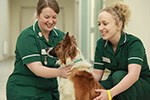Search - All Results
11 - 20 of 376 results
-
The RVC calls for canine health research funding data
Researchers at the Royal Veterinary College (RVC) are calling on specialist veterinary and non-university organisations that carry out research into canine health and welfare to participate in a study which seeks to inform future funding strategies. … -
Researchers from Royal Veterinary College (RVC) have found that the effectiveness of testing anti-epileptic drugs (AEDs) for canine epilepsy is far below the expected standard.
The RVC’s canine epilepsy clinic has carried out the first ever systematic review on the efficacy of all AEDs in canine epilepsy. The aim of the study was to assess the effectiveness of each individual AED by analysing all available data that has …The RVC’s canine epilepsy clinic has carried out the first ever systematic review on the efficacy …
-
First ever systematic review and meta-analysis of adverse effect of antiepileptic drugs in canine epilepsy
Researchers found that much of the evidence for the medical treatment of canine epilepsy was based on subpar reporting of adverse effect and in studies that were below the expected standard.How safe are antiepieleptic drugs? RVC research sheds light on epilepsy treatments.
Researchers …
-
RVC research into canine respiratory coronavirus could provide insights into current pandemic
Just published in the journal Veterinary Pathology, the RVC's Prof Simon Priestnall is the author of an invited commentary on canine respiratory coronavirus.Just published in the journal Veterinary Pathology, the RVC's Prof Simon Priestnall is the author …
-
Canine Epilepsy
some content to go here -
Two RVC students awarded prizes at prestigious International Canine Health Awards
Two students, Michelle Farrow and Sierra Latshaw, from the Royal Veterinary College (RVC) have been awarded prizes at the International Canine Health Awards in the ‘Student Inspiration Award’ category in recognition of their contributions to the … -
New RVC study sheds light on the prognosis of aggressive canine cancer
New research from the RVC VetCompass Programme has provided fresh insights into survival rates for dogs diagnosed with haemangiosarcoma, one of the most aggressive cancers in companion animals. Despite an association with extremely poor survival … -
New evidence for health-related welfare prioritisation of canine disorders
The RVC's VetCompass™ programme have investigated the severity and duration of the major conditions seen in practice in addition to recording their frequency to provide an overall measure of welfare impact -
The Effectiveness of Antimicrobials for the Treatment of Canine Pyoderma in the UK (Complete)
This study aimed to estimate the frequency of canine pyoderma and its treatment and to evaluate risk factors for treatment relapse and failure in UK primary and referral veterinary practice. -
Article
RVC’s Epilepsy Journey
Rowena Packer, Lecturer in Companion Animal Behaviour and Welfare Science and BBSRC Research Fellow, reflects on the contributions of RVC research to the care of pets with epilepsy, including several important milestones, and looks to the future. …







